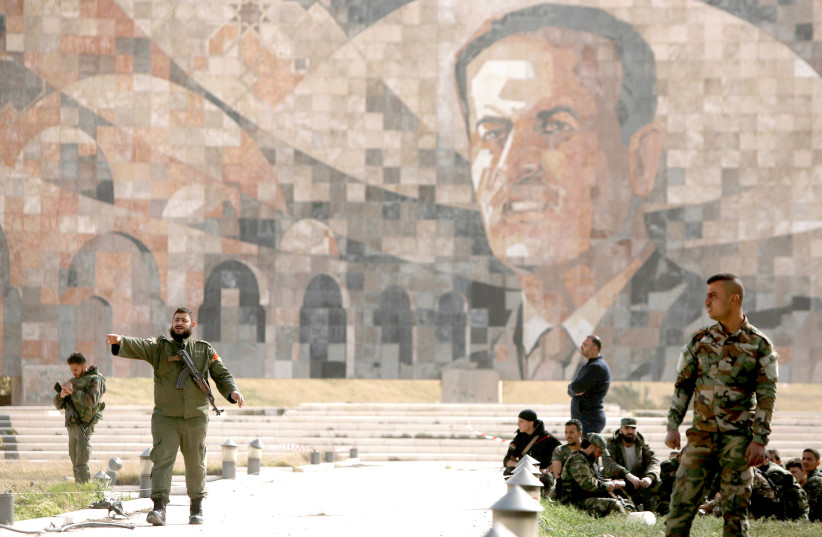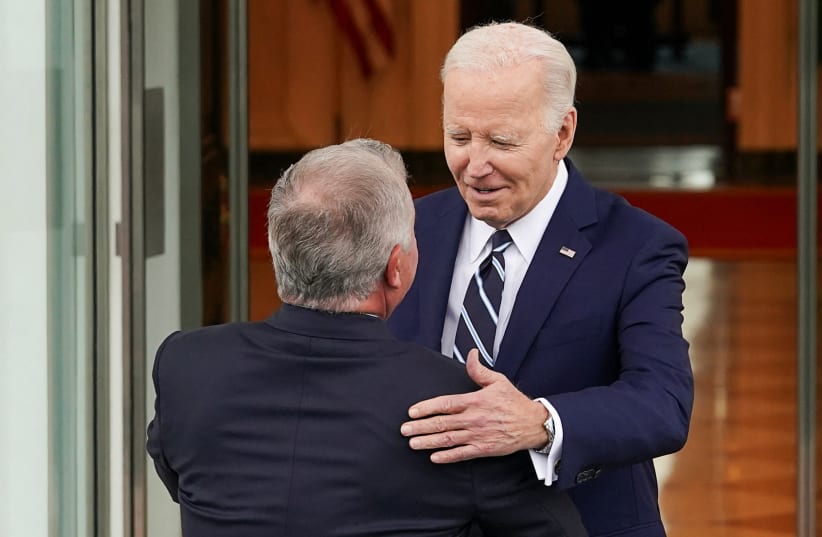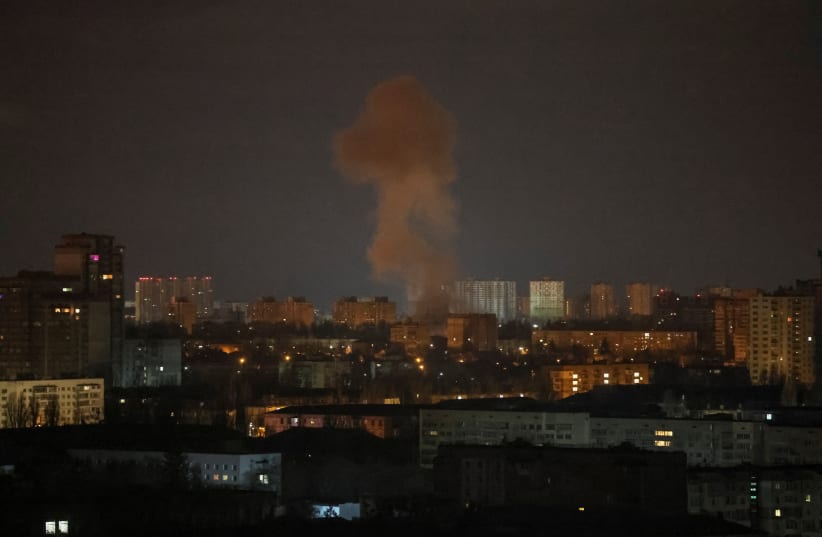And there shall be signs in the sun, and in the moon, and in the stars; and upon the earth distress of nations, withperplexity Strongs Number 640: aporia, ap-or-ee´-a; from the same as 639; a (state of) quandary: — perplexity.; the sea and the waves roaring; — Luke 21:25
"And say, Thus saith the Lord GOD; Behold, I am against thee, O Gog, the chief prince of Meshech and Tubal: And I will turn thee back, and put hooks into thy jaws, and I will bring thee forth, and all thine army, horses and horsemen, all of them clothed with all sorts of armour, even a great company with bucklers and shields, all of them handling swords: Persia, Ethiopia, and Libya with them; all of them with shield and helmet: Gomer, and all his bands; the house of Togarmah of the north quarters, and all his bands: and many people with thee." — Ezekiel 38:1-6
 Editor’s Note:
Editor’s Note:
• Jesus is coming soon, in this Generation, and all the players are gathering to invade Israel.
• Keep looking up church!
Article Source: Jerusalem Post
In late November, Turkey set its sights on a new goal. In Libya, a long-forgotten civil war was raging. The government in Tripoli, often called the Government of the National Accord, was losing ground to the Libyan National Army, led by a man named Khalifa Haftar, whose forces were based in eastern Libya.
Turkey supports Tripoli; Egypt supports Haftar. It is part of a much wider struggle that represents Turkey’s attempt to revive influence not seen since the end of the First World War. A century ago, the European powers thought that the Ottoman Empire could be easily chopped up and its territories were given away. Read More Related Articles
Today Turkey is back, moving into areas like northern Iraq, northern Syria, Libya, and even the Gulf and Somalia. The Paris Peace Conference that ended in January 1920, 100 years ago, helped the stage for many of the issues still facing the Middle East. It is hard to remember now, but much of what we take for granted regarding the borders of the Middle East is in some ways arbitrary. They were decided on partly after World War I in a series of treaties, such as the Treaty of Sevres of 1920 and Treaty of Lausanne of 1923. Why is Hatay province, once called Alexandretta, in Turkey, when it could have been in Syria? Why is Mosul in Iraq and not in Turkey, as Turkey once claimed it? Why do the Kurds lack a state? The recent tensions in the Middle East, the unresolved questions from Lebanon to Iraq, Libya, Turkey, and Gaza, are all part of this. LET US begins where Turkey now ends its recent ambitions – in Libya. Libya was once the setting for a quiet proxy war that reflects divisions in the Muslim world between the Muslim Brotherhood, which Turkey’s ruling party has roots in, and countries that oppose the Brotherhood. Turkey’s ruler President Recep Tayyip Erdogan has increasingly global ambitions. Embattled Libya could be a key to them, thought Turkish leaders around Erdogan. Turkey was already sending drones and armored vehicles to Tripoli. But they had not stemmed the tide. Haftar vowed in November to take Tripoli and rid the country of “terrorists” and “militias.” Turkey responded that the “warlord” Haftar would have to be stopped.
But Turkey wanted something in return for helping to stop him. It wanted rights to the Mediterranean between Turkey and Libya.
If you draw a line from Libya to Turkey, you run into Greek islands like Crete. But if you draw a line from eastern Libya, there is a passage between Cyprus and the Greek islands that narrowly links Turkey to Libya. It is here that Turkey made a bold chess move. In exchange for sending some fighters to bolster the Tripoli government, Turkey would get an exclusive economic zone that splits Cyprus from Greece by sea and gives Turkey rights to explore for natural gas. It also sinks the dreams of Greece and Cyprus to invite companies like ENI to explore for natural resources under the sea. The play by Turkey has muscle behind it. Ankara has been sending its navy out to conduct drills around Cyprus, showing the flag and its power. Turkey has new sea-based missiles. It is buying new drilling ships. Cyprus thought it was ahead of the curve, signing deals with Egypt in 2003, Lebanon in 2007 and Israel in 2010. But Turkey has thrown down a gauntlet. One should understand Turkey’s treatment of the Greeks and Cypriots historically. Turkey invaded Cyprus in 1974 claiming to help protect members of the Turkish minority. Turkey has stayed ever since, recognizing Northern Cyprus as a country. No one else recognizes it, but Turkey says Northern Cyprus has widespread rights to explore for gas around Cyprus. Turkey has sent drones to Cyprus to show that it will police those waters it claims. For Turkey, the Cyprus operation was a way to show it would not be removed from more islands in the Mediterranean – for instance, the Dodecanese Islands, near Rhodes, were taken by Italy during a war with the Ottoman Empire in 1912. Rhodes also was held by Italy, then by Germany during World War II, and finally became part of Greece in 1947. Turkey today says that these islands, even though they are part of Greece technically, cannot be used by Greece to determine its rights to the waters off the islands. Instead, the continental shelf that extends from Turkey gives Erdogan’s country rights to the sea.TURKEY’S DECISION to revive its claims to the sea and send forces to Libya should be seen in the light of a century of Turkey’s policies since the fall of the Ottoman Empire. The Ottomans lost Libya to the Italians in 1912. Now, the Turks are back. Turkey has flirted with various policies since the end of the Ottomans. For a few years in the 1920s, it looked like the country would be dismantled. However, Turkey pushed the Greeks out of modern-day Turkey and embarked on a campaign of Turkish nationalism and secularism that supplanted European rule in Istanbul and created the current borders. But Ankara was never entirely satisfied. It felt that its formerly powerful role had been reduced. During the Cold War, Turkey was an ally of the US and also suffered its own internal troubles and coups. At the time, Turkey’s neighbors seemed to be advancing. Syria under Hafez Assad, the father of the current embattled president, was trying to be an Arab socialist paradise. Borrowing heavily from secular nationalist traditions of European fascism blended with socialism and Arab nationalism, the Assadist regime was brutal to dissenters, but treated loyalists decently. It wanted to modernize and look like an eastern European state, with the Communist-style brutalist high-rises and lots of Soviet tanks and other assorted accouterments. It left to fester the questions that arose after 1920. For instance, what about the Kurds in eastern Syria? The Assadist Ba’athist regime treated them like they didn’t exist, suppressing them and denying much citizenship. The Assad regime also ignored large Arab tribes along the Euphrates. Those tribes sometimes looked to Saddam’s Iraq across the border for cultural relations with other tribes in Anbar province. Saddam Hussein, like the Assads, was a product of the Arab nationalist revolutionary era. All these regimes, from Assad to Saddam to Nasser’s Egypt, were products of a reaction against the colonial era of the British and French mandates. They had replaced the old system of kings and colonials and sheiks. They wanted modernity. In some way, they were reactions also against the Jewish nationalism of Zionism, which they hated, and also the secular Turkish nationalism of Ataturk. If there were to be Jewish and Turkish states, so there would be an Arab nationalist group of states as well.
Iraq never worked out the problems the British colonials had saddled it with. The British wanted to include Mosul in Iraq so there would be more Sunni Arabs to support the Hashemite king they had chosen. The king was from what is now Saudi Arabia and a brother of the king of Jordan at the time. But for Iraq, he became the first Iraqi. That didn’t mean much to Kurds in the north, who also wanted freedom and independence. It is sometimes forgotten that a brief independent Kurdish state called the Republic of Mahabad had arisen in 1946 after World War II. Like the changeover in power of Rhodes or the question of whether Hatay would be part of Turkey, this republic was a byproduct of unresolved questions from the 1920s. Kurds wanted freedom and rights. Instead, they were forced to be part of states that didn’t recognize or want them. They were told to be Arab nationalists or Turkish nationalists, not Kurds. For the colonial powers, this didn’t matter. For the nationalist regimes, they were a headache. For the US and Soviets in the Cold War, they were tools to be used and discarded. This system that arose in the 1920s and then in the 1960s revolved around questionable states like Iraq, Syria, and Lebanon. Egypt was an ancient state, but Damascus had its own ambitions. At one point, the Arab Revolt had sought to hold Damascus as part of a greater Arab state. The British and French said no to that. Instead, the Kingdom of Jordan became a Bedouin kingdom. The kingdoms that were created in the 20th century may have seemed weak at the outset, but they had more staying power than the nationalist regimes. Instead, the regimes – from Gaddafi in Libya to Saddam in Iraq and Ali Abdullah Saleh in Yemen – were overthrown. The Nasserist regime, too, fell apart in 2011 when the Arab Spring broke out. Zine el-Abidine Ben Ali of Tunisia was also forced out. So too the Algerian regime. Why did some of the monarchies survive and not others? The British helped shepherd to power the kingdom of Egypt of Farouk. King Idris of Libya appeared a more formidable ruler, but he was pushed from office in 1969 while away for medical treatment in Turkey. The Gulf monarchies, by contrast, and the Moroccan and Jordanian monarchies, have survived. Likely because their states are either more homogenous or because of their traditions of rule, they have had more success. THE PAST 10 years have witnessed an extraordinary reversal, as most of the Arab countries have been torn apart from within. Where monarchies or Arab nationalism failed, rising religious extremism preyed on weak states. But even this Islamist terrorist rise did not supplant the new states. ISIS came and went. Even the Muslim Brotherhood, briefly rising in Gaza and even in Tripoli or other areas, and seeking election in Tunisia, Jordan and other places, has not been the success that some thought. Political Islam is not winning. What has happened is that the historically powerful periphery states, Turkey and Iran, have risen to grab influence throughout the Middle East. These states, as the Ottoman Empire and Persian Empire, were weakened in 1920 and European powers supplanted their historic role. But now, with Europe looking more insular, these countries are rising again. Turkey’s expedition to Libya is just one symbol of that new world order in the Middle East.





1 thought on “THE OTTOMANS ARE BACK – WHAT DOES THAT MEAN FOR ISRAEL?”
Turkey, Libya, Sudan, Russia, Iran, are the players in the Ezekiel 38&39 war against Israel. although these countries don’t agree with one another the three main players Russia, Iran & Turkey met in Kazakhstan’s capital, Nur-Sultan, for two days of trilateral talks concerning Syria.
Israel is surrounded by these countries and their proxies. as Syria has no money, and Assad s a mere puppet, they are going to end up looking at Israel and it gas and oil fields. By Libya and Turkey increasing their claim on international waters, they are obviously trying to sabotage the pipeline form the Israeli fields to Crete. this also brings Turkey closer to incorporating Libya into it’s dream of recreating the caliphate it once headed under the Ottoman empire destroyed after world war one.
The players are all in position, but as I read scripture Damascus must be full destroyed and become a ruinous heap so far large portion have been destroyed by both Israel and the USA, but it is not fully and totally destroyed. Keep looking up, keep you lamps trims and filled, we are closer today as we were yesterday.